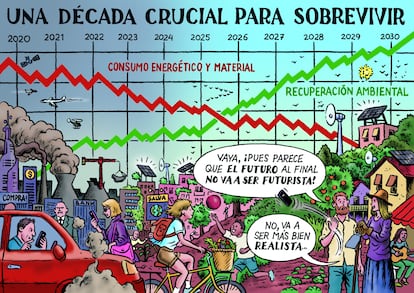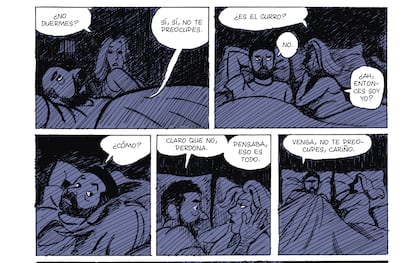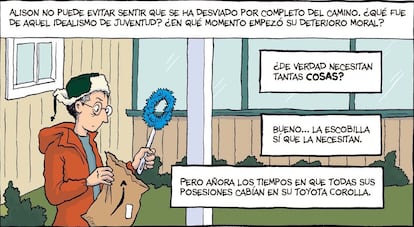All human beings laugh, cry, eat, sleep, love. Even if most of the day is spent on another universal activity: working. So complaints about it are also widely shared, from one part of the planet to another. Too many hours, stress, demands, resignations and some etcetera. Ever since it triumphed, neoliberal capitalism has been repeating that there are no alternatives. Lately, however, a simple option to dispute this has emerged. Or know the rules and shadows of the game in which we all participate. Just read one of the many comics about economics, exploitation and other workplace disasters that continue to be published. It turns out that another world is possible, at least in the comics.
“We must understand economics ourselves, otherwise we will be at the mercy of some charlatan,” warns writer Michael Goodwin. He himself contributed his grain of sand: first he delved into decades of treatises and thinkers; then, inside Ecomix (Lunwerg), summarized in cartoons – with drawings by Dan E. Burr – what he had learned: theories, practices and pitfalls of the last two centuries of development. There we discover that even Adam Smith, who went down in history as a bulwark of the free market, denounced the “rapacity” of the magnates and insinuated suspicions about his legislative proposals. Or it reflects on a society that is democratic in its structures, but “dictatorial” in many companies. “Every public issue or decision is economic. In the United States, the rich have essentially bought the institutions. If we had structured the economy differently, they couldn’t have done it. It was our choice. Or they never presented it to us in those terms,” Goodwin adds.
Ecomix yes it does. And it nullifies the excuse of excessive complexity: now understanding – indignation? – it is within everyone’s reach. Like the recent graphical version of Capital and ideology (Deusto): the original volume, of 1,248 pages, can make even the worshipers of its author, Thomas Piketty, dizzy. But the comic by Claire Alet and Benjamin Adan reduced them to 176. The ideas of the new social justice guru appear simplified, although no less lucid. And, certainly, more accessible. Sales went so well that another essay by Piketty, A brief history of equality (Deusto), has just made the same leap, led by Sébastien Vassant and Stephen Desberg. Which offers, incidentally, the most paradoxical example of capitalist power: even its criticism can become a profit-maximizing tendency.
The truth is that there are cheap comics of all types, tone, author, origin, era and color. welcome to the worldby the Spanish Miguel Brieva (Astiberri), opts for a colorful and explicit satire, where a little girl asks her mother: “Hey, mommy, do poor people really exist?” From the pool and the privileges they swim in, it certainly doesn’t seem like it. The whistle as the air rushesby Louka Butzbatch (Fulgencio Pimentel), opts instead for the white, red and thin metaphor: an enormous potato that threatens to crush a city. And Darryl Cunningham chooses another path: inside Billionairesbefore and inside Elon Musk. Portrait of an oligarch (Planeta Cómic), now, underlines that the climb to the top often sacrifices scruples, legality and workers’ rights along the way. A confirming conclusion How the rich plunder Him planet (Garbuix), by Hervé Kempf and Juan Mendez.

Fewer answers, although many questions, have Alison Bechdel, who in Worn out (Reservoir Books) faces another difficulty: capitalism swallows up so much that even the most coherent end up making concessions. Even if Philippe Squarzoni tests the conscience: those who read The dark fingerprint (Errata Naturae) will not forget the environmental cost resulting from the use of smartphones or technologies. “Postsummer ice cover in the Arctic has declined by more than 40 percent since 1979,” the graphic essay reports. Each of its pages invites criticism, not only of oneself: “In France, 63 billionaires pollute more than half the population.” Nor will shipments be requested so lightly once finished The wonderful world of Amazon (Rule). It is clear that getting off the wheel seems difficult. At the same time, ignoring the consequences of letting her escape, behind these comics, becomes impossible.
Even more so when they are fatal. Kanikosen, by the Japanese Go Fujio (Gallonero), adapts a double story of death to manga: the communist writer Takiji Kobaiashi denounced in 1929 in the novel of the same name the slavery of work on board fishing boats in his country, which however cost him his life due to torture by the police in 1933. And When work kills (Garbuix) needs no further explanation beyond the title and knowing that its protagonist’s tragedy is based on true events. “This comic was born from a journalistic investigation into a wave of suicides in companies like Renault or France Telecom. After that, for a while, a certain awareness emerged. The problem was seen, analysed, named. But only the details were changed, while the issue is in the system. Fundamentally, nothing has changed”, complains journalist Hubert Prolongeau, co-author together with Arnaud Delalande and Grégory Mardon.

For Goodwin, today is even worse than the end of Ecomix, published in Spain in 2024. “We are clearly entering a dystopian era. But it is worth remembering that this is more of a failed utopia. Specifically, the one that free-market economists sold us, which worked in their equations, but not in the real world, and is now collapsing,” the writer emphasizes. That’s why he created his graphic essay. And he celebrates all the different reactions he has received from the public: those who simply finished the comic and are more informed; who continued to read more and more; and even today’s “professional economists” who got their start thanks to its pages. “Many of us are concerned about these issues, but we don’t know where to start. And we are often very busy. That’s why a comic can be ideal,” he continues. Although the summary took a lot of effort: in retrospecthe realized he wasn’t writing more than a page a day. I would write 20, I would halve them, I would cut more and more. Not in all cases it worked: sometimes he threw away what was left. And start again.
“The advantage is that you reach more people and it can be simpler. The problem is that it is too simple and fails to convey all the complexity. Or, if you try, it could become difficult and lose its advantages,” believes Prolongeau. So When the work killing, Compared to the original research, it focuses on a single individual. His name is Carlos, but he could be anyone who has seen how quickly enthusiasm and ambition end up rhyming with depression and exploitation. Same as the graphical version of Capital and ideology follows a family through the decades, allowing the reader to see what descendants sometimes prefer to forget: fortunes and inequalities built on slavery, lobby, colonialism and stratagems that are as little legal as they are ethical.

In this regard, the comics have some hints. Universal basic income is mentioned in both Ecomix as in Capital and ideology. The anthology Ecotopias (Astiberri) includes several feasible changes and sketches a greener planet and other improvements they would bring. And Prolongeau claims to defend the mental health of employees: “The paradox of suicide in the workplace is that it affects the people most affected. If you don’t care about your profession, you don’t feel that recognition is at stake.” “There are many options. We don’t even have to imagine them, we just look around. Social democracy works much better than unregulated capitalism by almost every measure,” says Goodwin. There is one recommendation that, in some way, sums them all up: slow down, brake, even stop. Even just for a little while, to read a comic. Goodwin adds: “It has a low barrier to entry and can add more people to these debates. And not just as readers. It only takes one person to write a comic. Anyone can start today.” As long as you find the time, because there is a lot to do every day. Sleep, eat, love. And I work.



